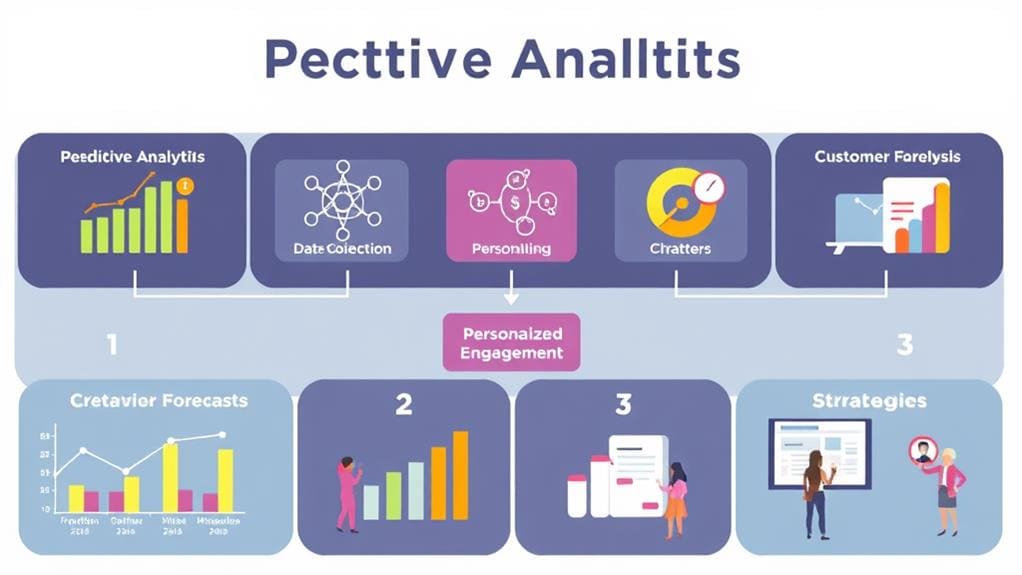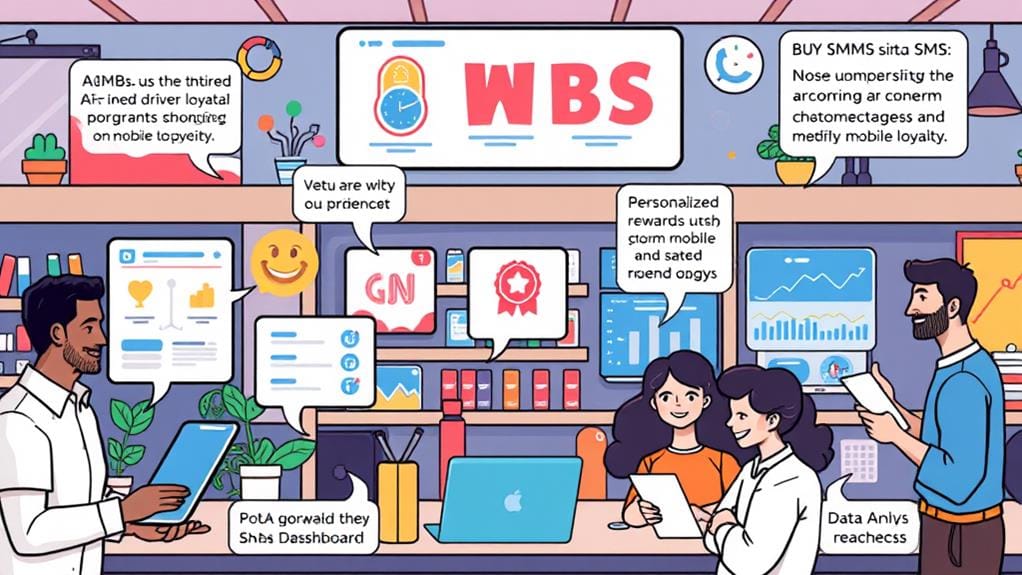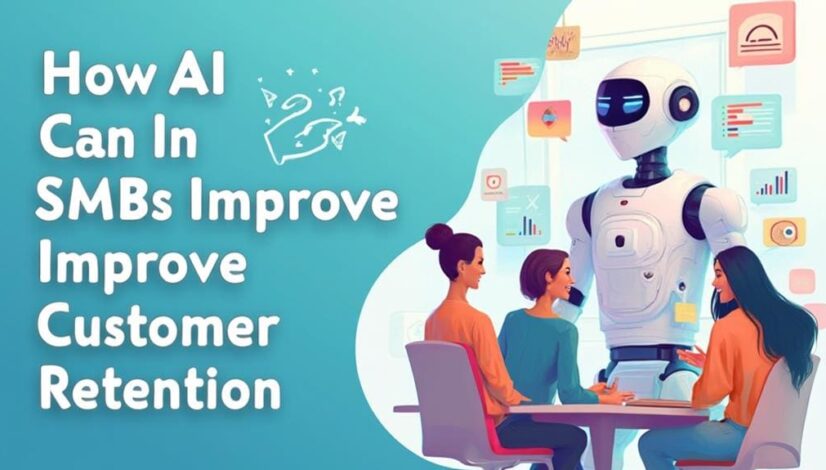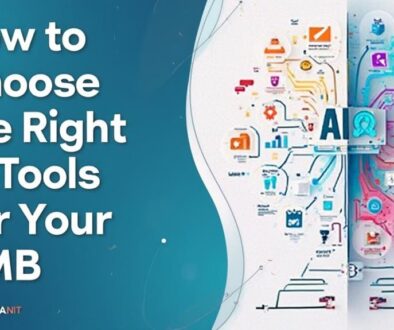How AI Can Help SMBs Improve Customer Retention
AI greatly enhances customer retention for small and medium-sized businesses (SMBs) by leveraging data analytics to understand customer behavior and preferences. Through personalized marketing efforts, businesses can target communications effectively, fostering loyalty. Predictive analytics help anticipate customer needs, enabling proactive engagement. Automation streamlines customer support, ensuring immediate assistance and consistent experiences. Additionally, AI-powered loyalty programs create tailored incentives that resonate with varying customer segments. By collecting and analyzing feedback, SMBs can continually refine their strategies to meet evolving demands. With AI driving these initiatives, businesses can cultivate stronger relationships and improve retention rates, revealing new opportunities for growth.
Key Takeaways
- AI analyzes customer behavior and demographics to inform personalized marketing efforts, enhancing engagement and loyalty.
- Predictive analytics anticipate customer needs, allowing SMBs to tailor their retention strategies effectively.
- Automation of customer support, including chatbots, increases efficiency and responsiveness, improving overall customer satisfaction.
- AI-driven loyalty programs use advanced segmentation and behavior tracking to create personalized rewards that enhance customer connections.
- Continuous feedback collection and analysis help SMBs identify pain points, enabling them to adapt and improve the customer journey.
Understanding Customer Behavior

Understanding customer behavior is akin to deciphering a complex map that reveals the pathways to loyalty and retention. It requires a thorough exploration of the customer journey, employing various analytical tools to provide insights into engagement metrics and usage trends. By conducting detailed behavior analysis, businesses can uncover essential patterns in purchase behavior and identify retention drivers that help maintain a robust clientele.
Engagement metrics serve as crucial indicators of customer interaction. They enable businesses to parse through sentiment tracking data to understand how customers feel about their products and services. This emotional undercurrent often plays a pivotal role in whether customers return or seek alternatives.
Additionally, demographic insights illuminate the characteristics of different customer segments, providing a clearer picture of what drives their loyalty. Recognizing age, gender, location, and preferences can further tailor the customer experience, making it more appealing and aligned with expectations.
Furthermore, purchase patterns reveal not only what customers are buying but also how frequently they engage with the brand. Understanding these nuances aids businesses in crafting strategies that resonate with varying target groups.
In the quest for customer retention, an in-depth exploration of these elements fosters informed decision-making. By equipping themselves with accurate data on customer behavior, SMBs can effectively nurture relationships, enhance satisfaction, and ultimately drive long-term success, allowing customers the freedom to choose their loyalty allegiance.
Personalization of Marketing Efforts
In today's competitive landscape, personalization in marketing is essential for capturing consumer attention and fostering loyalty.
By employing tailored messaging strategies and leveraging predictive analytics, small and medium-sized businesses can effectively meet the unique needs of their customers.
This targeted approach not only enhances engagement but also drives retention by creating meaningful connections with consumers.
Tailored Messaging Strategies
Tailored messaging strategies are crucial for small and medium-sized businesses aiming to enhance customer retention and foster brand loyalty. By leveraging customer segmentation, SMBs can identify distinct groups within their audience, allowing for more focused and effective targeted outreach. This approach guarantees that marketing messages resonate with the unique values and preferences of each segment.
Integrating behavior insights into these strategies additionally amplifies their effectiveness. Understanding engagement metrics enables businesses to refine message timing, guaranteeing that communications reach customers when they are most receptive. Moreover, recognizing channel preferences allows SMBs to deliver content through the mediums their customers prefer, enhancing the overall experience.
To improve content relevance, businesses should emphasize clear value propositions that showcase how their offerings can solve specific problems for customers. By addressing their needs directly within tailored messages, SMBs can markedly improve the likelihood of user engagement and loyalty.
In a time when consumers seek personal connections with brands, adopting tailored messaging strategies is not merely beneficial; it is a crucial investment in sustaining long-term customer relationships. Ultimately, this targeted approach positions SMBs for sustained growth in an increasingly competitive marketplace.
Predictive Analytics Applications
Leveraging predictive analytics enhances the effectiveness of tailored messaging strategies by enabling SMBs to anticipate customer needs and preferences. By utilizing data segmentation, businesses can identify distinct customer groups and address their specific preferences, ultimately reducing customer churn.
Through trend forecasting and behavior modeling, SMBs can accurately predict purchasing patterns, which aids in implementing proactive marketing approaches. Sales prediction tools allow companies to estimate future revenue streams, empowering them to allocate resources efficiently and optimize marketing efforts.
Engagement metrics generated from these predictive models facilitate a deeper understanding of customer interactions, allowing businesses to refine their strategies continually. By conducting risk assessments, SMBs can identify potential churn triggers and develop targeted campaigns to preemptively retain customers.
Furthermore, pattern recognition provides valuable market insights that enhance personalization efforts, tailoring content to align with customer desires. This all-encompassing approach not only fosters stronger customer relationships but also contributes to revenue optimization.
Ultimately, harnessing predictive analytics paves the way for SMBs to maintain a competitive edge, ensuring that they engage customers with the right message at the right time, thereby promoting long-term loyalty.
Predictive Analytics for Retention

Predictive analytics serves as a powerful tool for small and medium-sized businesses (SMBs) aiming to enhance customer retention strategies. By leveraging sophisticated algorithms and data-driven insights, SMBs can conduct customer segmentation to identify key demographics that exhibit distinct usage patterns and engagement metrics. This strategic approach enables businesses to tailor their retention strategies, ultimately leading to improved customer loyalty.
Central to predictive analytics is churn prediction, which empowers SMBs to anticipate potential attrition and proactively address customer concerns. By analyzing historical data, businesses can develop cohort analysis models that highlight groups at risk of leaving, allowing for targeted interventions.
Additionally, sentiment analysis assists in understanding customer attitudes and experiences, further refining these retention strategies. Data visualization techniques play a critical role, transforming intricate datasets into digestible insights that facilitate informed decision-making.
Understanding the lifetime value of customers also guides revenue forecasting, enabling SMBs to focus resources on segments most likely to yield sustainable growth. By integrating these capabilities, businesses can create a thorough framework for understanding their customers and enhancing retention.
Ultimately, the application of predictive analytics not only equips SMBs with the tools to forge deeper connections with their clientele but also paves the way for lasting partnerships. Aligned with a commitment to continuous improvement, these data-informed strategies position SMBs to thrive in a competitive landscape, ensuring that they meet and exceed the expectations of their customers.
Automation of Customer Support
The automation of customer support presents an opportunity for SMBs to enhance efficiency and customer satisfaction through streamlined communication channels.
By leveraging AI, businesses can deliver personalized support experiences that cater to individual customer needs while facilitating proactive issue resolution.
This strategic approach not only helps retain existing customers but also fosters loyalty in an increasingly competitive marketplace.
Streamlined Communication Channels
Automating customer support through streamlined communication channels greatly enhances the efficiency and responsiveness of small and medium-sized businesses (SMBs). By leveraging technology, SMBs can engage effectively and guarantee a consistent brand experience across various platforms.
Here are three key benefits of this approach:
- Chatbot Implementation: Integrating chatbots offers immediate responses to inquiries, markedly reducing response time while guaranteeing real-time notifications keep customers informed throughout their journey.
- Multi-Channel Integration: A unified communication strategy across email, social media, and other platforms fosters seamless shifts between channels. This not only strengthens social media engagement but also provides customers with choices that enhance their experience.
- Feedback Loops: Implementing collaborative tools allows businesses to gather ongoing feedback. This information can inform adjustments in support strategies, creating a cycle of continuous improvement that optimizes the customer journey.
Incorporating these elements creates a robust support system that empowers SMBs to uphold brand consistency while adapting to customer needs.
Ultimately, streamlined communication channels lay the groundwork for effective customer retention strategies and foster a sense of freedom for both teams and clients.
Personalized Support Experiences
In an increasingly competitive landscape, delivering personalized support experiences has become essential for small and medium-sized businesses (SMBs) seeking to enhance customer loyalty and satisfaction. By leveraging AI, SMBs can automate customer support while tailoring interactions to individual needs throughout the customer journey.
AI-driven tools allow businesses to collect valuable data that introduces the concept of empathy mapping. This method helps businesses understand emotions and pain points experienced by customers, enabling them to create highly targeted support strategies. With greater insights, SMBs can predict customer preferences, identifying key moments that matter during interactions.
Additionally, chatbots and virtual assistants can provide immediate, personalized responses, ensuring customers feel valued and understood. This not only increases efficiency but also fosters an emotional connection that enhances brand loyalty.
By streamlining processes and tailoring support, SMBs can shift from reactive to proactive customer service, greatly improving overall satisfaction.
In essence, the integration of AI into support functions is pivotal for SMBs. It enables a nuanced understanding of customer journeys that enhances personalized experiences, laying the foundation for long-lasting relationships and increased retention rates.
Proactive Issue Resolution
Leveraging advanced AI technologies, SMBs can shift the focus from reactive customer service to proactive issue resolution, markedly enhancing customer satisfaction and loyalty.
By incorporating AI-driven automation, businesses can streamline their customer support processes, ensuring that potential issues are identified and addressed before they escalate.
Here are three critical components of proactive issue resolution:
- Issue Tracking: Implementing AI-powered software allows for continuous monitoring of customer interactions, enabling businesses to spot trends or common problems swiftly.
- Root Cause Analysis: By analyzing patterns in customer feedback and support tickets, companies can pinpoint the root cause of recurring issues, which aids in developing effective long-term solutions.
- Feedback Loops: Establishing robust feedback mechanisms empowers customers to share their experiences, facilitating adjustments to services and fostering customer empathy.
Furthermore, integrating quick resolutions through automated assistance improves service recovery and reduces the need for complex escalation procedures.
Loyalty Programs Enhanced by AI

As small and medium-sized businesses (SMBs) endeavor to deepen customer relationships, harnessing the power of artificial intelligence in loyalty programs proves to be a game-changer. Leveraging AI algorithms allows businesses to gain insights through advanced customer segmentation, effectively categorizing their clientele based on purchasing behaviors and preferences. This tailored approach enables the creation of personalized loyalty tiers that resonate with different customer segments, enhancing engagement rates.
Through behavior tracking, AI tools can analyze engagement metrics, identifying patterns in customer interactions. This data-driven insight facilitates reward optimization, guaranteeing that user incentives are not only attractive but also strategically aligned with customer desires. By integrating various data sources, businesses can achieve seamless program customization, fostering a sense of individuality and connection among customers.
Moreover, implementing AI in loyalty programs allows for dynamic adjustments based on real-time feedback loops. This adaptability guarantees that programs remain relevant and appealing, ultimately reducing potential churn rates. As customers interact with the loyalty program, SMBs can refine their offerings, creating a more engaging experience which cultivates long-lasting relationships.
In an increasingly competitive landscape, SMBs embracing AI-enhanced loyalty programs position themselves as leaders in customer retention. By adopting these innovative strategies, businesses not only enhance the overall customer experience but also empower customers with a sense of ownership and belonging, fostering brand loyalty that translates into sustained revenue growth.
The future of customer loyalty lies in the strategic integration of AI, truly transforming how businesses connect with their customers.
Gathering and Analyzing Feedback
Utilizing diverse channels for gathering customer feedback is essential for SMBs aiming to enhance their loyalty programs and strengthen customer relationships. By implementing AI-driven methodologies, businesses can streamline feedback collection processes, thereby amplifying user engagement and deriving actionable customer insights.
The integration of advanced analytics into feedback mechanisms allows organizations to gain a deeper understanding of their customers' sentiments through techniques such as sentiment analysis and opinion mining. Leveraging these insights can help identify trends, ultimately driving more effective strategies for retention.
Here are three critical approaches for gathering and analyzing feedback:
- Survey Optimization: Tailor surveys to suit customer preferences and maximize response rates, ensuring questions are concise and relevant.
- Response Tracking: Monitor feedback submission patterns to recognize peak engagement times, enhancing the timing and impact of follow-up communications.
- Data Visualization: Employ visual tools to represent feedback data, facilitating clearer trend identification and enabling stakeholders to grasp insights quickly.
Moreover, integrating feedback into business operations empowers decision-makers by supporting trend identification, which drives informed strategic choices.
Frequently Asked Questions
How Can AI Help With Social Media Customer Interactions?
Artificial intelligence greatly enhances social media customer interactions by employing social listening and engagement analytics.
Through advanced algorithms, AI can monitor customer sentiments and feedback in real time, allowing businesses to respond promptly and effectively to inquiries or concerns.
Engagement analytics provide valuable insights into customer preferences and behaviors, fostering more personalized interactions.
This strategic approach not only strengthens customer relationships but also empowers brands to adapt and thrive in a dynamic digital marketplace.
What Budget Should SMBS Allocate for AI Tools?
In the domain of modern commerce, much like the delicate balance of a well-tuned orchestra, the budget allocated for AI tools should reflect an SMB's strategic vision.
Effective AI investment strategies suggest dedicating 5-10% of revenue to technology initiatives. This thoughtful budget allocation empowers businesses to harness innovation while maintaining operational flexibility.
Are There Specific AI Tools Best for Smbs?
When considering AI tools for small to medium-sized businesses (SMBs), platforms that offer user-friendly interfaces and robust automation features are essential.
Tools such as chatbots enhance customer interaction, while data analytics provide valuable customer insights that drive personalized marketing strategies.
The SMB benefits from leveraging AI to streamline operations and customize engagement, ultimately fostering stronger customer relationships.
Investing in these solutions is a strategic move toward sustaining competitive advantage in a dynamic market.
What Metrics Indicate Effective Ai-Driven Retention Strategies?
Effective AI-driven retention strategies can be assessed through several key metrics.
Customer behavior insights, derived from predictive analytics, play a vital role in understanding engagement rates and identifying churn prediction factors.
Additionally, monitoring satisfaction scores allows businesses to gauge customer contentment, while implementing personalization strategies enhances the overall experience.
How to Train Staff on Using AI Technologies?
Effectively training staff on AI technologies requires a well-structured approach to AI training that fosters staff engagement and promotes technology adoption.
Begin by evaluating existing skill levels and tailoring training programs accordingly, focusing on practical applications of AI.
Incorporate hands-on workshops, interactive sessions, and access to resources for ongoing skill development.
Encouraging collaboration among employees can further enhance understanding and confidence in utilizing AI, ultimately empowering teams to leverage technology effectively.
Conclusion
In the dynamic landscape of small and medium-sized businesses, the integration of artificial intelligence offers not merely a competitive edge, but a lifeline for customer retention. Through the nuanced understanding of customer behavior and the ability to personalize interactions, AI transforms retention strategies into powerful tools for engagement and loyalty. As businesses embrace these technological advancements, the pursuit of customer satisfaction becomes not just a goal, but a sustainable journey toward enduring success.




